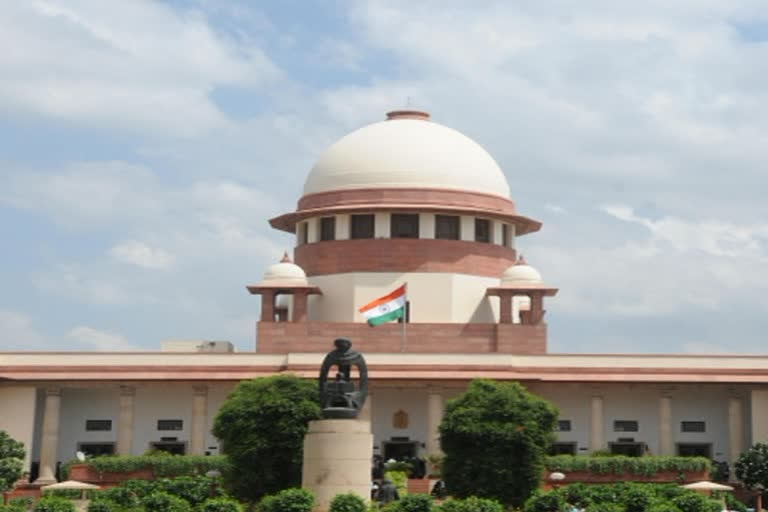New Delhi: The Union Government on Thursday moved the apex court seeking a review of its order for premature release of six convicts in the Rajiv Gandhi assassination case. The Centre said the order granting remission to the convicts, who had assassinated the former prime minister, was passed without affording it adequate opportunity for hearing despite it being a necessary party to the case.
The government highlighted the alleged procedural lapse, saying the convicts seeking remission did not formally implead the Centre as a party which resulted in its non-participation in the case. "Thus absence of any assistance by the Union of India, due to procedural lapse of convicts/petitioners, while the present matter was being finally heard and decided has prevented this Court from appreciating the crucial and important evidence in the matter, which if presented, would have assisted this court to arrive at a just and correct judgment in the matter, it said.
On November 11, the top court had ordered premature release of six convicts, including Nalini Sriharan, who had hosted the assassin, noting the Tamil Nadu government had recommended remission of their sentence. Besides Nalini, R P Ravichandran, Santhan, Murugan, Robert Payas and Jayakumar walked out of the jail following the Supreme Court order. In its review plea, the central government said certain facts were in its possession but could not be placed before the court to enable it to arrive at a correct judgment and to do complete justice in the "peculiar and shocking" facts and circumstances.
It said four out of the six convicts granted remission are Sri Lankans. "Granting remission to terrorist of foreign nation, who had been duly convicted in accordance with the law of land for gruesome offence of assassinating the former Prime Minister of the Country, is a matter which has international ramification and therefore falls squarely within the sovereign powers of the Union of India," the review petition said. It said, "In such a sensitive matter the assistance of Union of India was of paramount importance as the matter has huge repercussions on the public order, peace, tranquility and criminal justice system of the Country."
On November 11, the top court while ordering the release of the convicts had noted their conduct was satisfactory during incarceration and they had undertaken various studies. The apex court said its earlier judgement in the case of A G Perarivalan, one of the convicts released earlier, was equally applicable in the matter of six others. Invoking its extraordinary power under Article 142 of the Constitution, the top court had on May 18 ordered the release of Perarivalan, who had served over 30 years in jail.
Under Article 142, the top court may issue any verdict or order necessary to provide "complete justice". The Tamil Nadu government had earlier favoured the premature release of Nalini and Ravichandran, saying its 2018 advice for remission of their life sentence is binding upon the governor. In two separate affidavits, the state government had told the top court that in a cabinet meeting held on September 9, 2018, it had considered mercy petitions of seven convicts in the case and resolved to recommend to the governor remission of their life sentences invoking the power granted under Article 161 of the Constitution.
Nalini and Ravichandran had moved the top court seeking premature release. Both of them had challenged a June 17 order of the Madras High Court, which rejected their pleas for early release, and cited the apex court judgment ordering the release of co-convict Perarivalan. Nalini, Santhan, Murugan, Perarivalan, Robert Payas, Jayakumar and Ravichandran were sentenced for life. The state government had earlier said it is the competent authority to take a decision on the petition filed by Nalini and Ravichandran under Article 161 of the Constitution and the "decision of the state cabinet dated September 9, 2018 thereon is final and it can be exercised by governor of Tamil Nadu as per the aid and advice of the cabinet".
Both Nalini and Ravichandran were on ordinary leave (parole) from December 27, 2021 as sanctioned by the Tamil Nadu government under the Tamil Nadu Suspension of Sentence Rules, 1982. The high court had on June 17 rejected the petitions of Nalini and Ravichandran, to order their release without the consent of the state's governor. Gandhi was assassinated on the night of May 21, 1991 at Sriperumbudur in Tamil Nadu by a woman suicide bomber, identified as Dhanu, at an election rally.
In its May 1999 order, the top court had upheld the death sentence of four convicts Perarivalan, Murugan, Santhan and Nalini. However, in 2014, it commuted the death sentence of Perarivalan to life imprisonment along with those of Santhan and Murugan on grounds of delay in deciding their mercy petitions. Nalini's death sentence was commuted to life imprisonment in 2001 on the consideration that she has a daughter.



